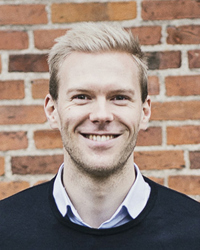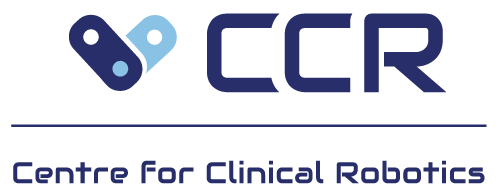Augmented Gravity (2022-2023)
When a doctor has to perform a bronchoscopy, a binocular scope must be held still in the patient's lung for up to an hour and a half at a time. Therefore, many endoscopists develop pain in muscles and joints that affects their physical and mental health. In the worst case, it can lead to reduced work function and illness.
PROJECT PERIOD
Start: 1 June 2022
End: 31 January 2023
Therefore, in this project, an automated robot system was developed, which would alleviate the endoscopists' load. The robot system worked by connecting the scope to a wire that hung from a motor in the ceiling. The system would continuously record the weight load from the scope and the doctor's arm, and with more than 100 calculations per second ensure that the weight load went to zero. The doctor therefore continued to have free movement, but did not get tired in the arm, as the robotic system neutralised the force of gravity.
AIM
The aim of the project was to develop a robotic system that could alleviate the endoscopists' load and reduce their pain.
The project was implemented in three phases.
- Development and testing of the first prototype
- Development of tests of the second prototype. It had to be investigated how much the robot system actually relieved the user of the weight, and whether there were other needs that the system had to fulfill in practice
- User-driven development of the final robotic system that could achieve CE approval. Finally, a research project had to investigate and document the effect when the system was used in clinical practice
The initial trials had shown that the solution also had the potential to facilitate the work of many other functions in a hospital, from egg retrieval to laboratory work.
PARTNERS
The project was carried out in collaboration with the Department of Respiratory Medicine at OUH.
From OUH, the Human Resources Department, Department of Occupational and Environmental Medicine, Department of Clinical Development and the Centre for Innovative Medical Technology (CIMT) also participated.
In addition, SDU Health Informatics and Technology at the Mærsk Mc-Kinney Møller Institute was a partner in the project.
FUNDING
The project is partly financed by the internal Innovation Fund at OUH and partly by the Otto Bruun Foundation, which has allocated 50,000 DKK to the project for materials that will be used to build a better and more adapted prototype of the robot system for relieving endoscopists.

Malte Kongstad Deleuran
Innovation Consultant
Odense University Hospital, Department of Clinical Development - Innovation, Research & HTA
(+45) 2165 7146 mkd@rsyd.dk
